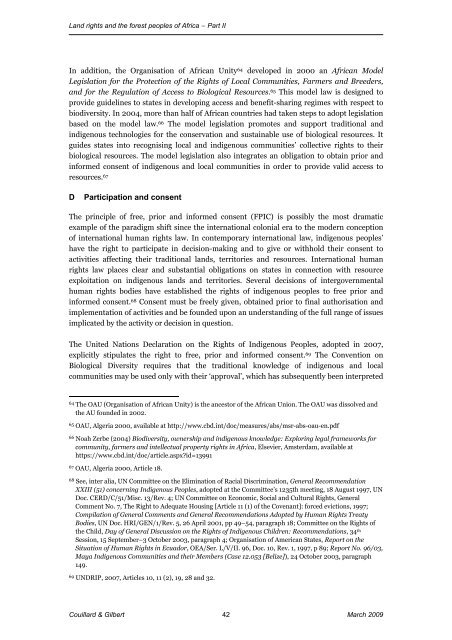Land Rights and the Forest Peoples of Africa
Land Rights and the Forest Peoples of Africa
Land Rights and the Forest Peoples of Africa
Create successful ePaper yourself
Turn your PDF publications into a flip-book with our unique Google optimized e-Paper software.
<strong>L<strong>and</strong></strong> rights <strong>and</strong> <strong>the</strong> forest peoples <strong>of</strong> <strong>Africa</strong> – Part II<br />
In addition, <strong>the</strong> Organisation <strong>of</strong> <strong>Africa</strong>n Unity 64 developed in 2000 an <strong>Africa</strong>n Model<br />
Legislation for <strong>the</strong> Protection <strong>of</strong> <strong>the</strong> <strong>Rights</strong> <strong>of</strong> Local Communities, Farmers <strong>and</strong> Breeders,<br />
<strong>and</strong> for <strong>the</strong> Regulation <strong>of</strong> Access to Biological Resources. 65 This model law is designed to<br />
provide guidelines to states in developing access <strong>and</strong> benefit-sharing regimes with respect to<br />
biodiversity. In 2004, more than half <strong>of</strong> <strong>Africa</strong>n countries had taken steps to adopt legislation<br />
based on <strong>the</strong> model law. 66 The model legislation promotes <strong>and</strong> support traditional <strong>and</strong><br />
indigenous technologies for <strong>the</strong> conservation <strong>and</strong> sustainable use <strong>of</strong> biological resources. It<br />
guides states into recognising local <strong>and</strong> indigenous communities’ collective rights to <strong>the</strong>ir<br />
biological resources. The model legislation also integrates an obligation to obtain prior <strong>and</strong><br />
informed consent <strong>of</strong> indigenous <strong>and</strong> local communities in order to provide valid access to<br />
resources. 67<br />
D<br />
Participation <strong>and</strong> consent<br />
The principle <strong>of</strong> free, prior <strong>and</strong> informed consent (FPIC) is possibly <strong>the</strong> most dramatic<br />
example <strong>of</strong> <strong>the</strong> paradigm shift since <strong>the</strong> international colonial era to <strong>the</strong> modern conception<br />
<strong>of</strong> international human rights law. In contemporary international law, indigenous peoples’<br />
have <strong>the</strong> right to participate in decision-making <strong>and</strong> to give or withhold <strong>the</strong>ir consent to<br />
activities affecting <strong>the</strong>ir traditional l<strong>and</strong>s, territories <strong>and</strong> resources. International human<br />
rights law places clear <strong>and</strong> substantial obligations on states in connection with resource<br />
exploitation on indigenous l<strong>and</strong>s <strong>and</strong> territories. Several decisions <strong>of</strong> intergovernmental<br />
human rights bodies have established <strong>the</strong> rights <strong>of</strong> indigenous peoples to free prior <strong>and</strong><br />
informed consent. 68 Consent must be freely given, obtained prior to final authorisation <strong>and</strong><br />
implementation <strong>of</strong> activities <strong>and</strong> be founded upon an underst<strong>and</strong>ing <strong>of</strong> <strong>the</strong> full range <strong>of</strong> issues<br />
implicated by <strong>the</strong> activity or decision in question.<br />
The United Nations Declaration on <strong>the</strong> <strong>Rights</strong> <strong>of</strong> Indigenous <strong>Peoples</strong>, adopted in 2007,<br />
explicitly stipulates <strong>the</strong> right to free, prior <strong>and</strong> informed consent. 69 The Convention on<br />
Biological Diversity requires that <strong>the</strong> traditional knowledge <strong>of</strong> indigenous <strong>and</strong> local<br />
communities may be used only with <strong>the</strong>ir ‘approval’, which has subsequently been interpreted<br />
64<br />
The OAU (Organisation <strong>of</strong> <strong>Africa</strong>n Unity) is <strong>the</strong> ancestor <strong>of</strong> <strong>the</strong> <strong>Africa</strong>n Union. The OAU was dissolved <strong>and</strong><br />
<strong>the</strong> AU founded in 2002.<br />
65<br />
OAU, Algeria 2000, available at http://www.cbd.int/doc/measures/abs/msr-abs-oau-en.pdf<br />
66<br />
Noah Zerbe (2004) Biodiversity, ownership <strong>and</strong> indigenous knowledge: Exploring legal frameworks for<br />
community, farmers <strong>and</strong> intellectual property rights in <strong>Africa</strong>, Elsevier, Amsterdam, available at<br />
https://www.cbd.int/doc/article.aspxid=13991<br />
67<br />
OAU, Algeria 2000, Article 18.<br />
68<br />
See, inter alia, UN Committee on <strong>the</strong> Elimination <strong>of</strong> Racial Discrimination, General Recommendation<br />
XXIII (51) concerning Indigenous <strong>Peoples</strong>, adopted at <strong>the</strong> Committee’s 1235th meeting, 18 August 1997, UN<br />
Doc. CERD/C/51/Misc. 13/Rev. 4; UN Committee on Economic, Social <strong>and</strong> Cultural <strong>Rights</strong>, General<br />
Comment No. 7, The Right to Adequate Housing [Article 11 (1) <strong>of</strong> <strong>the</strong> Covenant]: forced evictions, 1997;<br />
Compilation <strong>of</strong> General Comments <strong>and</strong> General Recommendations Adopted by Human <strong>Rights</strong> Treaty<br />
Bodies, UN Doc. HRI/GEN/1/Rev. 5, 26 April 2001, pp 49–54, paragraph 18; Committee on <strong>the</strong> <strong>Rights</strong> <strong>of</strong><br />
<strong>the</strong> Child, Day <strong>of</strong> General Discussion on <strong>the</strong> <strong>Rights</strong> <strong>of</strong> Indigenous Children: Recommendations, 34 th<br />
Session, 15 September–3 October 2003, paragraph 4; Organisation <strong>of</strong> American States, Report on <strong>the</strong><br />
Situation <strong>of</strong> Human <strong>Rights</strong> in Ecuador, OEA/Ser. L/V/II. 96, Doc. 10, Rev. 1, 1997, p 89; Report No. 96/03,<br />
Maya Indigenous Communities <strong>and</strong> <strong>the</strong>ir Members (Case 12.053 [Belize]), 24 October 2003, paragraph<br />
149.<br />
69<br />
UNDRIP, 2007, Articles 10, 11 (2), 19, 28 <strong>and</strong> 32.<br />
Couillard & Gilbert 42<br />
March 2009





